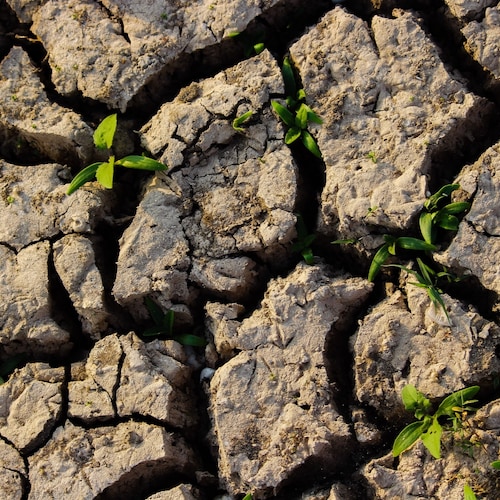Since the Covid-19 pandemic started more than two years ago, time has been put on hold and precarity has become an even more common feature of life globally. The inspiration for the title of this new call for reviews comes from this somewhat bleak realization : after the pandemic comes the war and a widely shared feeling of being pushed at the edges in a rapidly changing world. The books selected here examine the experiences of those living at the margins and who never enjoyed the comfort and stability of the privileged few. They also explore forms of care, solidarity, reparations that have emerged in response to exclusion in the hope of finding some creativeness for imagining a more optimistic future. If you are interested in reviewing one of these books, get in touch with us!
How to Proceed:
As we receive many requests for reviews, please send an email to reviews@allegralaboratory.net indicating which book you would like to review, your postal address, and 2-3 sentences explaining why you should be reviewing the book. Please explain how the book relates to your own research or interests. We will get back to you once we have selected the reviewers.
Lino e Silva, M. (2022). Minoritarian liberalism: A Travesti life in a Brazilian Favela. University of Chicago Press.
 A mesmerizing ethnography of the largest favela in Rio, where residents articulate their own politics of freedom against the backdrop of multiple forms of oppression.
A mesmerizing ethnography of the largest favela in Rio, where residents articulate their own politics of freedom against the backdrop of multiple forms of oppression.
Normative liberalism has promoted the freedom of privileged subjects, those entitled to rights—usually white, adult, heteronormative, and bourgeois—at the expense of marginalized groups, such as Black people, children, LGBTQ people, and slum dwellers. In this visceral ethnography of Rocinha, the largest favela in Rio de Janeiro, Brazil, Moisés Lino e Silva explores what happens when liberalism is challenged by people whose lives are impaired by normative understandings of liberty. He calls such marginalized visions of freedom “minoritarian liberalism,” a concept that stands in for overlapping, alternative modes of freedom—be they queer, favela, or peasant.
Lino e Silva introduces readers to a broad collective of favela residents, most intimately accompanying Natasha Kellem, a charismatic self-declared travesti (a term used in Latin America to indicate a specific form of female gender construction opposite to the sex assigned at birth). While many of those the author meets consider themselves “queer,” others are treated as “abnormal” simply because they live in favelas. Through these interconnected experiences, Lino e Silva not only pushes at the boundaries of anthropological inquiry, but also offers ethnographic evidence of non-normative routes to freedom for those seeking liberties against the backdrop of capitalist exploitation, transphobia, racism, and other patterns of domination.
Amarasuriya, H., Kelly, T., Maunaguru, S., Oustinova-Stjepanovic, G. and Spencer, J. (2021). The Intimate Life of Dissent: Anthropological Perspectives. University of Chicago Press.
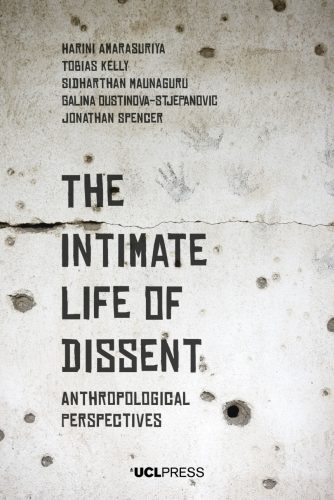 The Intimate Life of Dissent examines the meanings and implications of public acts of dissent, which, the authors argue, are never simply about abstract principles, but also come at great personal risk to both the dissidents and to those close to them. Dissent is, therefore, embedded in deep, complex, and sometimes contradictory intimate relations. This book puts acts of high principle back into the personal relations out of which they emerge and take effect, raising new questions about the relationship between intimacy and political commitment. It does so through examinations of practical examples, including Sri Lankan leftists, Soviet dissidents, Tibetan exiles, Kurdish prisoners, British pacifists, Indonesian student activists, and Jewish peace activists. The Intimate Life of Dissent will be of interest to postgraduate students and researchers in anthropology, history, political theory, and sociology, as well as to those teaching introductory undergraduate courses on political anthropology.
The Intimate Life of Dissent examines the meanings and implications of public acts of dissent, which, the authors argue, are never simply about abstract principles, but also come at great personal risk to both the dissidents and to those close to them. Dissent is, therefore, embedded in deep, complex, and sometimes contradictory intimate relations. This book puts acts of high principle back into the personal relations out of which they emerge and take effect, raising new questions about the relationship between intimacy and political commitment. It does so through examinations of practical examples, including Sri Lankan leftists, Soviet dissidents, Tibetan exiles, Kurdish prisoners, British pacifists, Indonesian student activists, and Jewish peace activists. The Intimate Life of Dissent will be of interest to postgraduate students and researchers in anthropology, history, political theory, and sociology, as well as to those teaching introductory undergraduate courses on political anthropology.
Pérez, M. (2022). The Right to Dignity: Housing Struggles, City Making, and Citizenship in Urban Chile. Stanford University Press.
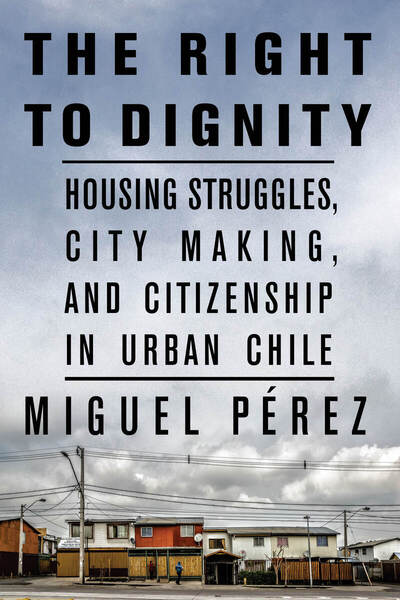 In the poorest neighborhoods of Santiago, Chile, low-income residents known as pobladores have long lived at the margins—and have long advocated for the right to housing as part of la vida digna (a life with dignity). From 2011 to 2015, anthropologist Miguel Pérez conducted fieldwork among the pobladores of Santiago, where the urban dwellers and activists he met were part of an emerging social movement that demanded dignified living conditions, the right to remain in their neighbourhoods of origin, and, more broadly, recognition as citizens entitled to basic rights. This ethnographic account raises questions about state policies that conceptualize housing as a commodity rather than a right, and how poor urban dwellers seek recognition and articulate political agency against the backdrop of neoliberal policies.
In the poorest neighborhoods of Santiago, Chile, low-income residents known as pobladores have long lived at the margins—and have long advocated for the right to housing as part of la vida digna (a life with dignity). From 2011 to 2015, anthropologist Miguel Pérez conducted fieldwork among the pobladores of Santiago, where the urban dwellers and activists he met were part of an emerging social movement that demanded dignified living conditions, the right to remain in their neighbourhoods of origin, and, more broadly, recognition as citizens entitled to basic rights. This ethnographic account raises questions about state policies that conceptualize housing as a commodity rather than a right, and how poor urban dwellers seek recognition and articulate political agency against the backdrop of neoliberal policies.
By scrutinizing how Chilean pobladores constitute themselves as political subjects, this book reveals the mechanisms through which housing activists develop new imaginaries of citizenship in a country where the market has been the dominant force organizing social life for almost forty years. Pérez considers the limits and potentialities of urban movements, framed by poor people’s involvement in subsidy-based programs, as well as the capacity of low-income residents to struggle against the commodification of rights by claiming the right to dignity: a demand based on a moral category that would ultimately become the driving force behind Chile’s 2019 social uprising.
Ahsan-Tirmizi, S. (2021). Pious Peripheries: Runaway Women in Post-Taliban Afghanistan. Stanford University Press.
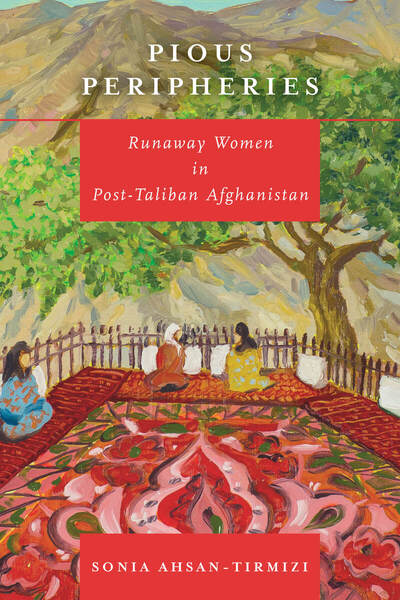 The Taliban made piety a business of the state, and thereby intervened in the daily lives and social interactions of Afghan women. Pious Peripheries examines women’s resistance through groundbreaking fieldwork at a women’s shelter in Kabul, home to runaway wives, daughters, mothers, and sisters of the Taliban. Whether running to seek marriage or divorce, enduring or escaping abuse, or even accused of singing sexually explicit songs in public, “promiscuous” women challenge the status quo—and once marked as promiscuous, women have few resources. This book provides a window into the everyday struggles of Afghan women as they develop new ways to challenge historical patriarchal practices.
The Taliban made piety a business of the state, and thereby intervened in the daily lives and social interactions of Afghan women. Pious Peripheries examines women’s resistance through groundbreaking fieldwork at a women’s shelter in Kabul, home to runaway wives, daughters, mothers, and sisters of the Taliban. Whether running to seek marriage or divorce, enduring or escaping abuse, or even accused of singing sexually explicit songs in public, “promiscuous” women challenge the status quo—and once marked as promiscuous, women have few resources. This book provides a window into the everyday struggles of Afghan women as they develop new ways to challenge historical patriarchal practices.
Sonia Ahsan-Tirmizi explores how women negotiate gendered power mechanisms, notably those of Islam and Pashtunwali. Sometimes defined as an honour code, Pashtunwali is a discursive and material practice that women embody through praying, fasting, oral and written poetry, and participation in rituals of hospitality and refuge. In taking ownership of Pashtunwali and Islamic knowledge, in both textual and oral forms, women create a new supportive community, finding friendship and solidarity in the margins of Afghan society. So doing, these women redefine the meanings of equality, honour, piety, and promiscuity in Afghanistan.
Agbiboa, D. E. (2022). They Eat Our Sweat: Transport Labor, Corruption, and Everyday Survival in Urban Nigeria. Oxford University Press.
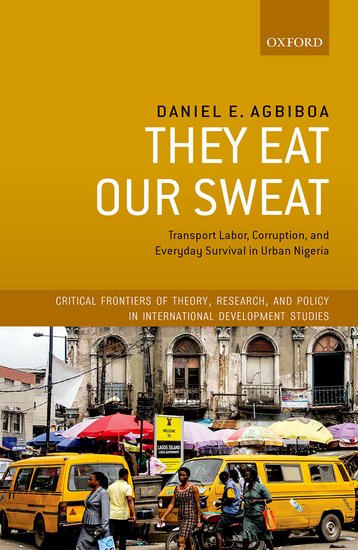 Accounts of corruption in Africa and the Global South are generally overly simplistic and macro-oriented, and commonly disconnect everyday (petty) corruption from political (grand) corruption. In contrast to this tendency, They Eat Our Sweat offers a fresh and engaging look at the corruption complex in Africa through a microanalysis of its informal transport sector, where collusion between state and non-state actors is most rife. Focusing on Lagos, Nigeria’s commercial capital and Africa’s largest city, Daniel Agbiboa investigates the workaday world of road transport operators as refracted through the extortion racket and violence of transport unions acting in complicity with the state. Steeped in an embodied knowledge of Lagos and backed by two years of thorough ethnographic fieldwork, including working as an informal bus conductor, Agbiboa provides an emic perspective on precarious labour, popular agency and the daily pursuit of survival under the shadow of the modern world system. Corruption, Agbiboa argues, is not rooted in Nigerian culture but is shaped by the struggle to get by and get ahead on the fast and slow lanes of Lagos. The pursuit of economic survival compels transport operators to participate in the reproduction of the very transgressive system they denounce. They Eat Our Sweat is not just a book about corruption but also about transportation, politics, and governance in urban Africa
Accounts of corruption in Africa and the Global South are generally overly simplistic and macro-oriented, and commonly disconnect everyday (petty) corruption from political (grand) corruption. In contrast to this tendency, They Eat Our Sweat offers a fresh and engaging look at the corruption complex in Africa through a microanalysis of its informal transport sector, where collusion between state and non-state actors is most rife. Focusing on Lagos, Nigeria’s commercial capital and Africa’s largest city, Daniel Agbiboa investigates the workaday world of road transport operators as refracted through the extortion racket and violence of transport unions acting in complicity with the state. Steeped in an embodied knowledge of Lagos and backed by two years of thorough ethnographic fieldwork, including working as an informal bus conductor, Agbiboa provides an emic perspective on precarious labour, popular agency and the daily pursuit of survival under the shadow of the modern world system. Corruption, Agbiboa argues, is not rooted in Nigerian culture but is shaped by the struggle to get by and get ahead on the fast and slow lanes of Lagos. The pursuit of economic survival compels transport operators to participate in the reproduction of the very transgressive system they denounce. They Eat Our Sweat is not just a book about corruption but also about transportation, politics, and governance in urban Africa
Jackson, A. (2021). Worlds of Care. The Emotional Lives of Fathers Caring for Children with Disabilities. University of California Press.
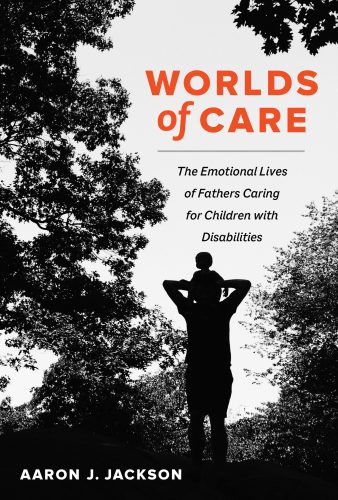 Vulnerable narratives of fatherhood are few and far between; rarer still is an ethnography that delves into the practical and emotional realities of intensive caregiving. Grounded in the intimate everyday lives of men caring for children with major physical and intellectual disabilities, Worlds of Care undertakes an exploration of how men shape their identities in the context of caregiving. Anthropologist Aaron J. Jackson fuses ethnographic research and creative nonfiction to offer an evocative account of what is required for men to create habitable worlds and find some kind of “normal” when their circumstances are anything but. Combining stories from his fieldwork in North America with reflections on his own experience caring for his severely disabled son, Jackson argues that care has the potential to transform our understanding of who we are and how we relate to others.
Vulnerable narratives of fatherhood are few and far between; rarer still is an ethnography that delves into the practical and emotional realities of intensive caregiving. Grounded in the intimate everyday lives of men caring for children with major physical and intellectual disabilities, Worlds of Care undertakes an exploration of how men shape their identities in the context of caregiving. Anthropologist Aaron J. Jackson fuses ethnographic research and creative nonfiction to offer an evocative account of what is required for men to create habitable worlds and find some kind of “normal” when their circumstances are anything but. Combining stories from his fieldwork in North America with reflections on his own experience caring for his severely disabled son, Jackson argues that care has the potential to transform our understanding of who we are and how we relate to others.
Zitcer, A. (2021). Practising Cooperation: Mutual Aid beyond Capitalism. University of Minnesota Press.
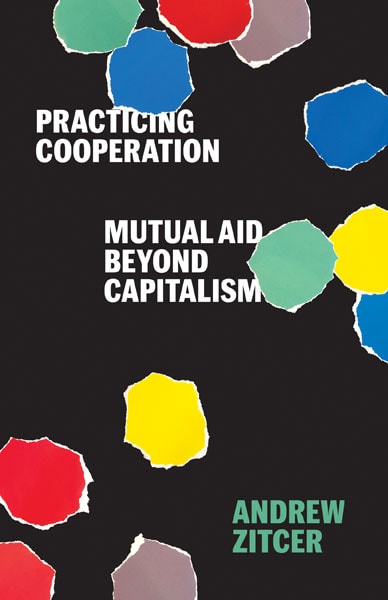 From the crises of racial inequity and capitalism that inspired the Black Lives Matter movement and the Green New Deal to the coronavirus pandemic, stories of mutual aid have shown that, though cooperation is variegated and ever-changing, it is also a form of economic solidarity that can help weather contemporary social and economic crises. Addressing this theme, Practicing Cooperation delivers a trenchant and timely argument that the way to a more just and equitable society lies in the widespread adoption of cooperative practices. But what renders cooperation ethical, effective, and sustainable?
From the crises of racial inequity and capitalism that inspired the Black Lives Matter movement and the Green New Deal to the coronavirus pandemic, stories of mutual aid have shown that, though cooperation is variegated and ever-changing, it is also a form of economic solidarity that can help weather contemporary social and economic crises. Addressing this theme, Practicing Cooperation delivers a trenchant and timely argument that the way to a more just and equitable society lies in the widespread adoption of cooperative practices. But what renders cooperation ethical, effective, and sustainable?
Providing a new conceptual framework for cooperation as a form of social practice, Practicing Cooperation describes and critiques three U.S.-based cooperatives: a pair of co-op grocers in Philadelphia, each adjusting to recent growth and renewal; a federation of two hundred low-cost community acupuncture clinics throughout the United States, banded together as a cooperative of practitioners and patients; and a collectively managed Philadelphia experimental dance company, founded in the early 1990s and still going strong. Through these case studies, Andrew Zitcer illuminates the range of activities that make contemporary cooperatives successful: dedicated practitioners, a commitment to inclusion, and ongoing critical reflection. He asserts that economic and social cooperation must be examined, critiqued, and implemented on multiple scales if it is to combat the pervasiveness of competitive individualism.
Practicing Cooperation is grounded in the voices of practitioners, and the result is a clear-eyed look at the lived experience of cooperators from different parts of the economy and a guidebook for people on the potential of this way of life for the pursuit of justice and fairness.
Yonucu, D. (2021). Police, Provocation, Politics: Counterinsurgency in Istanbul. Cornell University Press.
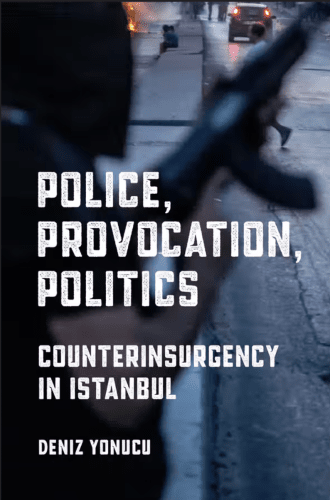 In Police, Provocation, Politics, Deniz Yonucu presents a counterintuitive analysis of contemporary policing practices, focusing particular attention on the incitement of counterviolence, perpetual conflict, and ethnosectarian discord by the state security apparatus. Situating Turkish policing within a global context and combining archival work and oral history narratives with ethnographic research, Yonucu demonstrates how counterinsurgency strategies from the Cold War and decolonial eras continue to inform contemporary urban policing in Istanbul. Shedding light on counterinsurgency’s affect-and-emotion-generating divisive techniques and urban dimensions, Yonucu shows how counterinsurgent policing strategies work to intervene in the organization of political dissent in a way that both counters existing alignments among dissident populations and prevents emergent ones.
In Police, Provocation, Politics, Deniz Yonucu presents a counterintuitive analysis of contemporary policing practices, focusing particular attention on the incitement of counterviolence, perpetual conflict, and ethnosectarian discord by the state security apparatus. Situating Turkish policing within a global context and combining archival work and oral history narratives with ethnographic research, Yonucu demonstrates how counterinsurgency strategies from the Cold War and decolonial eras continue to inform contemporary urban policing in Istanbul. Shedding light on counterinsurgency’s affect-and-emotion-generating divisive techniques and urban dimensions, Yonucu shows how counterinsurgent policing strategies work to intervene in the organization of political dissent in a way that both counters existing alignments among dissident populations and prevents emergent ones.
Yonucu suggests that in the places where racialized and dissident populations live, provocations of counterviolence and conflict by state security agents as well as their containment of both cannot be considered disruptions of social order. Instead, they can only be conceptualized as forms of governance and policing designed to manage actual or potential rebellious populations.
Mathur, N. (2021). Crooked Cats: Beastly Encounters in the Anthropocene. Chicago University Press.
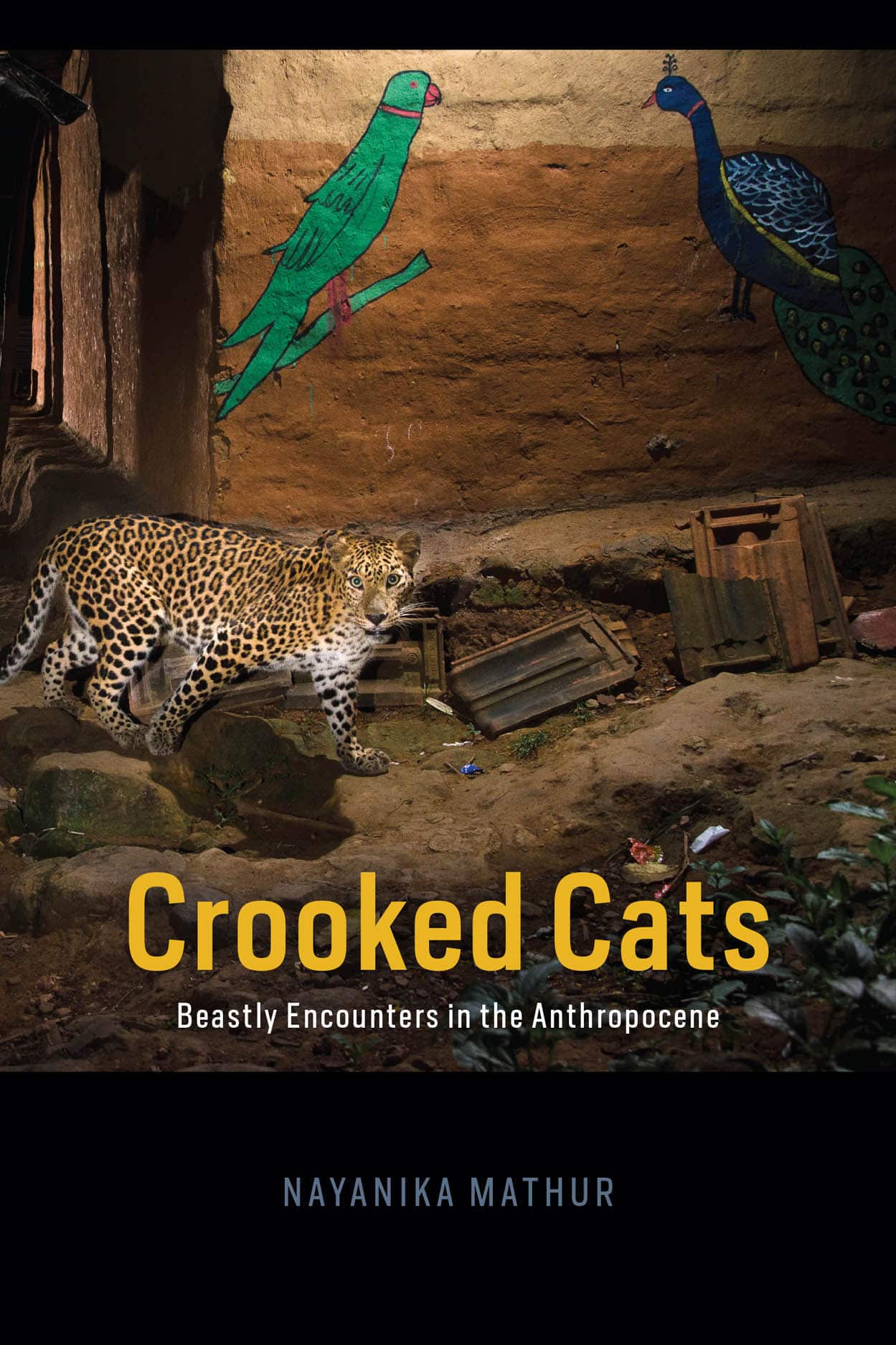 Big cats—tigers, leopards, and lions—that make prey of humans are commonly known as “man-eaters.” Anthropologist Nayanika Mathur reconceptualizes them as cats that have gone off the straight path to become “crooked.” Building upon fifteen years of research in India, this groundbreaking work moves beyond both colonial and conservationist accounts to place crooked cats at the center of the question of how we are to comprehend a planet in crisis.
Big cats—tigers, leopards, and lions—that make prey of humans are commonly known as “man-eaters.” Anthropologist Nayanika Mathur reconceptualizes them as cats that have gone off the straight path to become “crooked.” Building upon fifteen years of research in India, this groundbreaking work moves beyond both colonial and conservationist accounts to place crooked cats at the center of the question of how we are to comprehend a planet in crisis.
There are many theories on why and how a big cat comes to prey on humans, with the ecological collapse emerging as a central explanatory factor. Yet, uncertainty over the precise cause of crookedness persists. Crooked Cats explores in vivid detail the many lived complexities that arise from this absence of certain knowledge to offer startling new insights into both the governance of nonhuman animals and their intimate entanglements with humans. Through creative ethnographic storytelling, Crooked Cats illuminates the Anthropocene in three critical ways: as method, as a way of reframing human-nonhuman relations on the planet, and as a political tool indicating the urgency of academic engagement. Weaving together “beastly tales” spun from encounters with big cats, Mathur deepens our understanding of the causes, consequences, and conceptualization of the climate crisis.
Falkof, N. (2022) Worrier state. Risk, anxiety and moral panic in South Africa. Manchester University Press.
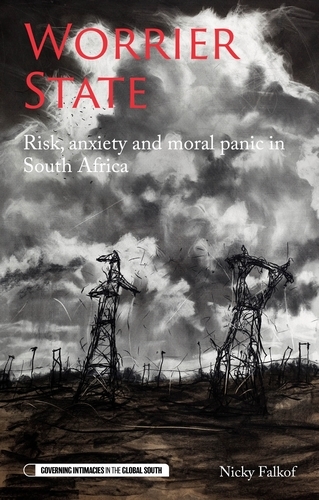 Risk, anxiety and moral panic are endemic to contemporary societies and media forms. How do these phenomena manifest in a place like South Africa, which features heightened insecurity, deep inequality and accelerated social change? What happens when cultures of fear intersect with pervasive systems of gender, race and class?
Risk, anxiety and moral panic are endemic to contemporary societies and media forms. How do these phenomena manifest in a place like South Africa, which features heightened insecurity, deep inequality and accelerated social change? What happens when cultures of fear intersect with pervasive systems of gender, race and class?
Worrier state investigates four case studies in which fear and anxiety appear in radically different ways: the far right myth of ‘white genocide’; so-called ‘Satanist’ murders of young women; an urban legend about township crime; and social theories about safety and goodness in the suburbs. Falkof foregrounds the significance of emotion as a socio-political force, emphasising South Africa’s imbrication within globalised conditions of anxiety and thus its fundamental and often-ignored hypermodernity. The book offers a bold and creative perspective on the social roles of fear and emotion in South Africa and thus on everyday life in this complex place.
Bhabha, J., Matache, M., Elkins, C. (ed.) ( 2021). Time for Reparations: A Global Perspective. University of Pennsilvania Press.
 In this sweeping international perspective on reparations, Time for Reparations makes the case that past state injustice—be it slavery or colonization, forced sterilization or widespread atrocities—has enduring consequences that generate ongoing harm, which needs to be addressed as a matter of justice and equity.
In this sweeping international perspective on reparations, Time for Reparations makes the case that past state injustice—be it slavery or colonization, forced sterilization or widespread atrocities—has enduring consequences that generate ongoing harm, which needs to be addressed as a matter of justice and equity.
Time for Reparations provides a wealth of detailed and diverse examples of state injustice, from enslavement of African Americans in the United States and Roma in Romania to colonial exploitation and brutality in Guatemala, Algeria, Indonesia, Jamaica, and Guadeloupe. From many vantage points, contributing authors discuss different reparative strategies and the impact they would have on the lives of survivor or descent communities.
One of the strengths of this book is its interdisciplinary perspective—contributors are historians, anthropologists, human rights lawyers, sociologists, and political scientists. Many of the authors are both scholars and advocates, actively involved in one capacity or another in the struggles for reparations they describe. The book therefore has a broad and inclusive scope, aided by an accessible and cogent writing style. It appeals to scholars, students, advocates and others concerned about addressing some of the most profound and enduring injustices of our time.
Tomás, A. (2022). In the Skin of the City: Spatial Transformation in Luanda. Duke University Press
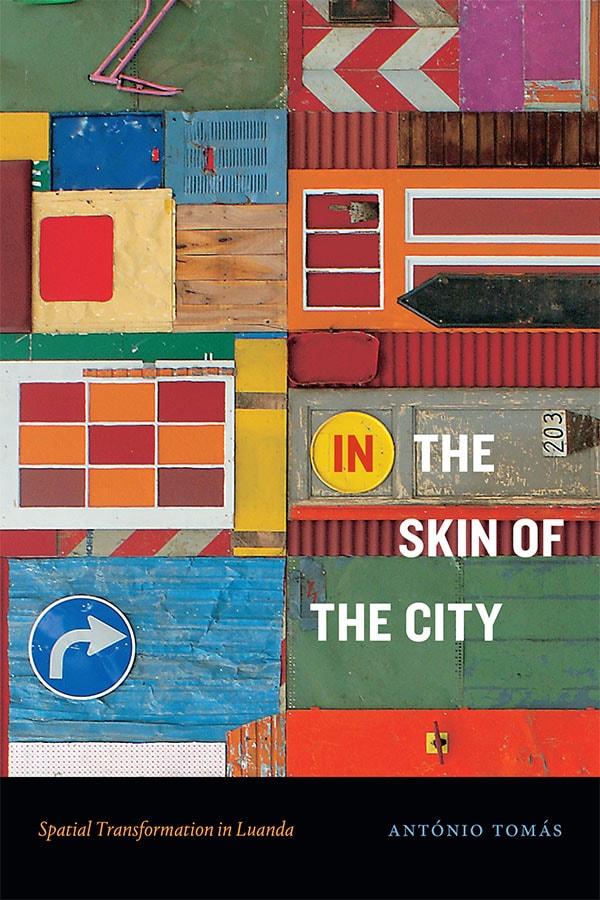 With In the Skin of the City, António Tomás traces the history and transformation of Luanda, Angola, the nation’s capital as well as one of the oldest settlements founded by the European colonial powers in the Southern Hemisphere. Drawing on ethnographic and archival research alongside his own experiences growing up in Luanda, Tomás shows how the city’s physical and social boundaries—its skin—constitute porous and shifting interfaces between center and margins, settler and native, enslaver and enslaved, formal and informal, and the powerful and the powerless. He focuses on Luanda’s “asphalt frontier”—the (colonial) line between the planned urban center and the ad hoc shantytowns that surround it—and the ways squatters are central to Luanda’s historical urban process. In their relationship with the state and their struggle to gain rights to the city, squatters embody the process of negotiating Luanda’s divisions and the sociopolitical forces that shape them. By illustrating how Luanda emerges out of the continual redefinition of its skin, Tomás offers new ways to understand the logic of urbanization in cities across the global South.
With In the Skin of the City, António Tomás traces the history and transformation of Luanda, Angola, the nation’s capital as well as one of the oldest settlements founded by the European colonial powers in the Southern Hemisphere. Drawing on ethnographic and archival research alongside his own experiences growing up in Luanda, Tomás shows how the city’s physical and social boundaries—its skin—constitute porous and shifting interfaces between center and margins, settler and native, enslaver and enslaved, formal and informal, and the powerful and the powerless. He focuses on Luanda’s “asphalt frontier”—the (colonial) line between the planned urban center and the ad hoc shantytowns that surround it—and the ways squatters are central to Luanda’s historical urban process. In their relationship with the state and their struggle to gain rights to the city, squatters embody the process of negotiating Luanda’s divisions and the sociopolitical forces that shape them. By illustrating how Luanda emerges out of the continual redefinition of its skin, Tomás offers new ways to understand the logic of urbanization in cities across the global South.
Knight, D. M. ( 2021 ). Vertiginous Life. An Anthropology of Time and the Unforeseen. Berghahn.
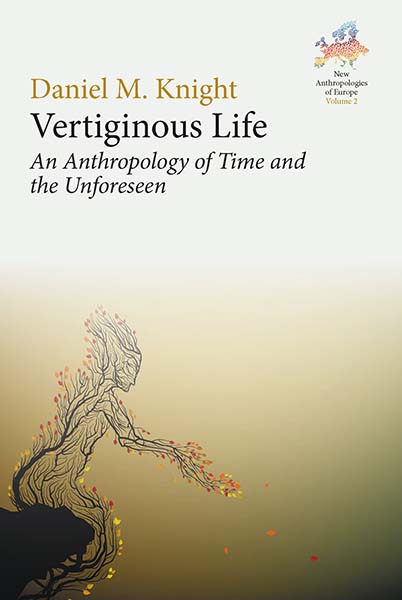 Vertiginous Life provides a theory of the intense temporal disorientation brought about by life in crisis. In the whirlpool of unforeseen social change, people experience confusion as to where and when they belong on timelines of previously unquestioned pasts and futures. Through individual stories from crisis Greece, this book explores the everyday affects of vertigo: nausea, dizziness, breathlessness, the sense of falling, and unknowingness of Self. Being lost in time, caught in the spin-cycle of crisis, people reflect on belonging to modern Europe, neoliberal promises of accumulation, defeated futures, and the existential dilemmas of life held captive in the uncanny elsewhen.
Vertiginous Life provides a theory of the intense temporal disorientation brought about by life in crisis. In the whirlpool of unforeseen social change, people experience confusion as to where and when they belong on timelines of previously unquestioned pasts and futures. Through individual stories from crisis Greece, this book explores the everyday affects of vertigo: nausea, dizziness, breathlessness, the sense of falling, and unknowingness of Self. Being lost in time, caught in the spin-cycle of crisis, people reflect on belonging to modern Europe, neoliberal promises of accumulation, defeated futures, and the existential dilemmas of life held captive in the uncanny elsewhen.
Allegra review guidelines:
All reviews should be completed within two months of the receipt of the book.
We use British English (i.e. use –ise and not –ize word endings). We encourage clear expression and simple sentence structures especially if English is not your first language.
Word limit: 750-1500 words.
Font: Times New Roman.
Size: 12.
Line Spacing: 1,5
No footnotes.
If you cite other authors, please reference their publication in the end.
When submitting the review, do not forget to include your name, (academic) affiliation (if any), a photograph of yourself and a short bio of 2-3 sentences.
Featured Image: Photo by Abhishek Pawar on Unsplash.

